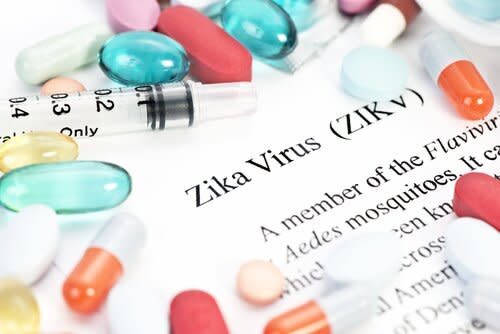Zika Update: No Evidence Microcephaly Is Linked to Pesticides

Sherry Yates Young/Shutterstock
You may have seen reports that pesticides, not Zika are responsible for the alarming rise in the birth defect microcephaly in Brazil and other South American and Caribbean countries. No scientific evidence, however, exists to back up that claim.
It's easy to understand why the pesticide pyriproxyfen is being blamed, as it is used to target the mosquitoes responsible for spreading the virus, and, admittedly, it gets into the drinking water in those areas. The theory was floated in a report by the Argentinian group Physicians in Crop-Sprayed Towns (PCST) last week, who alleged that because microcephaly was growing exponentially in Brazil where the pesticide is used, but not in Colombia where pyriproxyfen is not being used—despite that country having a high rate of Zika—the pesticide must be responsible.
"It's ridiculous. These guys come out of the blue, and people believe them, with no evidence at all. It really shows the lack of science education among the public," Ernesto Marques, associate professor of infectious diseases and microbiology at the University of Pittsburgh, told USA Today.
For its part, the World Health Organisation (WHO) is insisting that pyriproxyfen is safe in drinking water at the recommended levels.
Still, conflicting reports can cause confusion; at first it seemed clear microcephaly was definitively linked to Zika, and now this theory is creating uncertainty. And the truth is, the WHO has not come out and declared that yes, it's 100-percent certain the virus causes the birth defect. However, researchers have discovered genetic material from Zika in the brains, placenta, and amniotic fluid of several infants who have microcephaly. Some experts are calling the evidence of the link between the virus and the birth defect "overwhelming."
It's worth mentioning that pyriproxyfen has been used for decades in many countries in Europe and the U.S. without evidence of increased birth defects, but it may not have entered into drinking water like it has in Brazil.
To err on the side of caution, at least one Brazilian state has, for now, banned the pesticide from being used there. Still, the Brazilian Ministry of Health claims cases have increased even in places where the pesticide has not been sprayed.
Want the latest parenting news? Sign up for our free Parents Daily newsletter
The takeaway seems to be, as the USA Today piece and other news stories point out, that alarmist chatter is everywhere. This is a very scary situation, especially because new developments are being reported all the time. All we can do is stay up to date on what's going on, and make the best decisions we can for ourselves and our families given the most recent information.
Melissa Willets is a writer/blogger and a mom. Follow her on Twitter (@Spitupnsuburbs), where she chronicles her love of exercising and drinking coffee, but never simultaneously.
